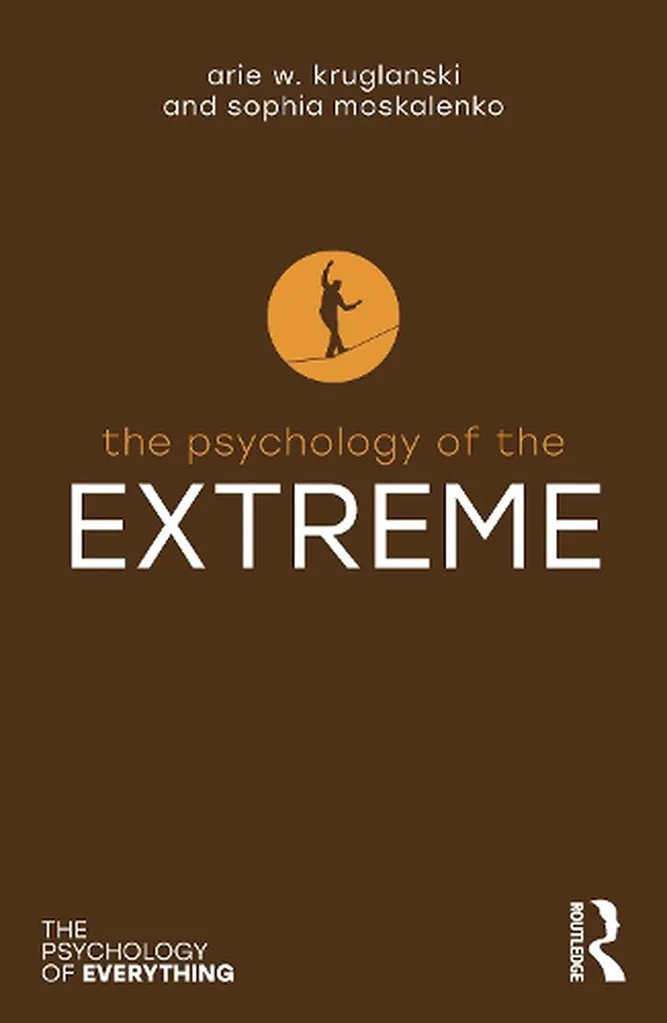- February 14, 2025
- By Laura Ours
The term “extremist” conjures images of terror attacks, coups and crimes committed in the name of religion. When we wonder what motivates extremism, we’re usually thinking about people very different from us—a distinct “other.” But in a new book, a University of Maryland professor and his coauthor suggest we should also be examining extremism as it occurs in our own communities and even in ourselves.

Distinguished University Professor Arie W. Kruglanski of the Department of Psychology and Sophia Moskalenko explore the full spectrum of extremism, its biological roots and its motivations in “The Psychology of the Extreme,” slated for publication later this month by Routledge. It helps explain how such behavior shows up in our daily lives and in our habits—and sometimes can even be helpful.
“We realized that there is more to extremism than what meets the eye, and that gave us the idea for this volume,” said Kruglanski, known for his influential theories on radicalization. He is the co-founder of UMD’s National Consortium for the Study of Terrorism and Responses to Terrorism, where Moskalenko previously worked as a postdoctoral researcher.
While personal extremism is often portrayed as destructive—think compulsive gambling, or engaging in divisive political rhetoric that harms relationships—American society celebrates what could be called “productive extremism.” For example, we applaud the training and performance of elite athletes, an actor’s “method” commitment to a role, success in following a highly restrictive diet or the rewards of “workaholic” behavior.
“We all know someone who is dedicated to something, whether it is building model trains or training for a marathon,” said Moskalenko, now a research fellow at Georgia State University. “And so this basic psychology of extremism is much broader, much more relatable, and is much more familiar to people in their daily lives than the violent extremism that is in the news.”
The book cites heroes who exhibited extremist approaches, from Marie Curie, who gave her life in the process of conducting groundbreaking research on radioactivity, to NBA great Kobe Bryant, known for his over-the-top approach to practice, training and pushing boundaries in his sport.
But it’s possible to draw misguided conclusions from our extreme heroes, she said.
“Singular dedication to one’s field or craft comes at personal cost, including depression and burnout,” Moskalenko said. “Extremism’s hallmark is a kind of social isolation.”
Extremism has biological and evolutionary roots, the authors contend, showing how the trait developed as an evolutionary mechanism that can be important in times of emergencies.
“You need to be extreme in order to counter the emergency, such as a firefighter rescuing people from a burning building,” Kruglanski said. “But as with all evolutionary mechanisms, extremism can go astray; it can have unintended consequences.”
Rather than an all-or-nothing approach to training, working or developing a talent, Kruglanski and Moskalenko recommend balance in pursuing one’s goals, which they say can help ease tension in the current political climate.
People who feel left behind amid globalization, financial crises, the COVID-19 pandemic, the immigration crisis can turn to extremism in politics as they look for dramatic, permanent fixes—"someone who is going to cut through the morass of ambiguity and provide a solution, an extreme solution that would put an end to people’s misery,” Kruglanski said.
Because social media’s echo chamber effect can encourage extremism, the authors recommend in-person connections and building stronger communities to combat isolation and feelings of low self-worth, and to promote healthier relationships and feelings of belonging and significance.
Kruglanski said he hopes that everyone will benefit from the book, but especially policymakers, educators, and “young people who are facing the turbulent environment that seems to exist today.”
“We can all benefit from understanding: self-understanding, and understanding extremism in the world, and how to counteract it and calm things down,” he said.
Topics
Research